人教版高中英语Book 8 Module 2 The Renaissance --- Printing公开课教学课件共37张PPT
- 格式:ppt
- 大小:13.70 MB
- 文档页数:37

高二英语Book 8 Module 2 The Renaissance外研社【本讲教育信息】一. 教学内容:Book 8 Module 2 The Renaissance二. 重难点讲解:重点单词:1. effect〔1〕n. a result or condition produced by a cause; something that happens when one thing acts on another 结果;影响;效果eg. The advertising campa ign didn’t have much effect on sales.这些广告攻势对销售额没起到多大作用。
〔2〕in effect in operation 在实施中,生效;in fact 实际上,事实上eg. The law is still in effect. 法律依然生效。
〔3〕come into effect 实施,实行eg. When does the new timetable come into effect? 新的时刻表什么时候实行?〔4〕take effect;to come into operation 实行,起作用;to begin to produce results 开始见效,奏效eg. The new system will take effect next May. 新制度将在五月开始实行。
The medicine quickly took effect. 这种药很快就见效了。
〔5〕effective adj. 有效的,有影响的2. motivate vt. to provide 〔someone〕with a 〔strong〕reason for doing something 激发,激励eg. There is little to motivate these kids to work hard at school.没有什么可用来激励孩子们在学校努力学习。
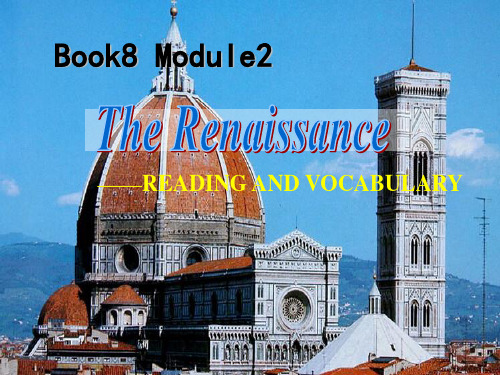
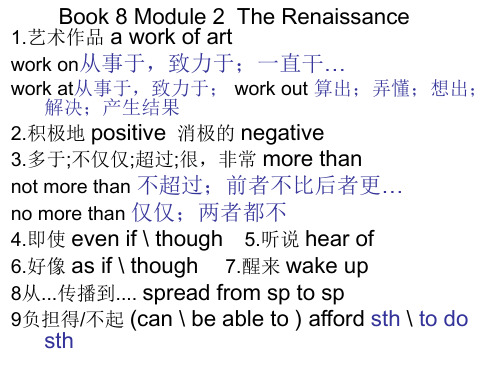
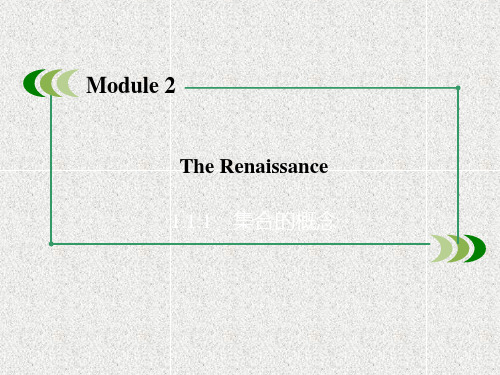
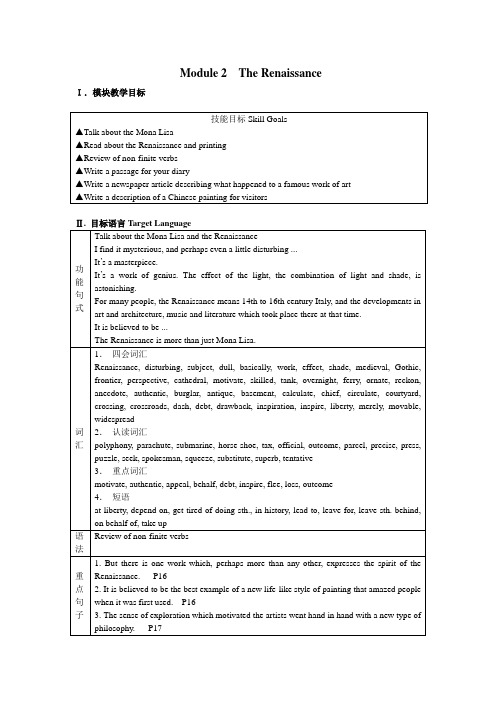
Module 2 The Renaissance I.模块教学目标III. 教材分析与教材重组1. 教材分析本模块以Renaissance为话题, 通过谈论蒙娜丽莎这一不朽艺术作品将话题逐步展开,并利用阅读、听力和描述(艺术作品)等学习方式,使学生对“文艺复兴”有一个较为全面、深刻的认识和理解,并能运用已有的历史知识和亲身经历评论艺术人物及作品,理解文艺复兴给欧洲文化、科技等方面带来的巨大影响。
1.1 INTRODUCTION部分首先呈现给学生人们对Mona Lisa这幅传世之作的不同看法,继而提供了部分专业词汇供学生讨论时使用,并对讨论内容与方式作了提示或指导。
这一活动既呈现了本单元的中心话题,又为下一步围绕the Renaissance进行的听说读写训练提供了素材。
1. 2 READING AND VOCABULARY(1)包括一篇阅读课文和六项活动。
其中Activity 1是阅读前的热身活动。
设计了与课文有关的连线题,让学生对欧洲文化发展进程有一个初步的了解。
Activity 2的任务是:在课文中快速找出特定的信息回答问题。
Activities 3 、4是为考查学生对课文的理解程度和学习课文中关于文艺复兴的词汇和短语而设计的两项任务。
Activities 5、6是问答题,旨在提高学生的理解能力,可与阅读同步进行。
供阅读的课文是一篇说明文,介绍了文艺复兴的含义、该时期文学艺术、政治思想、自然科学等领域所取得的成就及重要艺术人物Leonardo da Vince。
通过阅读,让学生认识到文艺复兴在欧洲历史发展中的重要地位,了解文艺复兴的重大历史意义在于它促使欧洲人从以神为中心过渡到以人为中心,在于人的觉醒,在于人们把重点从来世转移到现世。
它唤醒了人们积极进取的精神、创造精神以及科学实验的精神,从而在精神方面为资本主义制度的胜利和确立开辟了道路。
文章以对蒙娜丽莎的评价开始,以对其作者达·芬奇的评论结束,结构缜密,前后呼应。
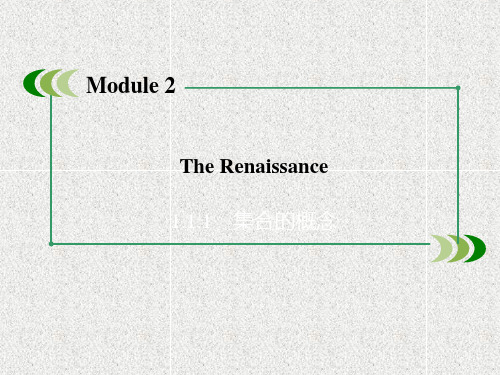
高中英语选修8 Module 2 The Renaissance知识点整理1.时态练习(1—Fined¥100!You know you_____100km an hour,don’t you?—No,officers.I can’t have been.This car doesn’t do 80.A.are drivingB.have drivenC.had drivenD.were driving(2Be quick,the doors____!You will just_____in time.A.have closed;take itB.are closed;miss itC.close;get itD.are closing;make it(3—I’m sorry,but there’s no smoking in the meeting room.—Oh,I____that.Sorry,I won’t do that again.A.don’t knowB.didn’t knowC.won’t knowD.haven’t know(4—Don’t use my handkerchief to wipe the table,gentleman.—Oh,I’m very sorry.I____it clearly.A.didn’t seeB.hadn’t seenC.wasn’t seeingD.can’t see(5The policeman’s attention was suddenly caught by a small black box which______plac ed under the minister’s car.A.has beenB.was beingC.had beenD.would be(6—Did he say that he would attend the concert tonight?—No,but he___for an important competition.A.preparedB.was preparingC.has been preparingD.has prepared(7Nobody has any idea that how long it will be before the hostages_____.A.are releasedB.will be releasedC.are to be releasedD.has been released(8I bet Jack_____when we get home.A.is still sleepingB.is to be sleeingC.will still be sleepingD.will have been sleeping(9—Is Tom still smoking?—No.By next Saturday he_____for a whole month without smoking a single cigarette.A.will goB.will have goneD.has been going(10—You didn’t lock the back door.—You are wrong.I____.A.have locked itB.lock it myselfC.did lock itD.do lock it.(11They_____on the program for almost one week before I joined them,and now we___ _on it as no good results have come out so far.A.had been working;are still workingB.had worked;were still workingC.have been working;have workedD.have worked;are still working(12—Has your former classmate come back from America?—Yes,he____there for eight years.A.has stayedB.staysC.stayedD.had stayed(13—What is the price of petrol these days?—Oh,it____sharply since last month.A.is raisedB.has risenC.has arisenD.is increased(14My parents have promised to come to see me before I____for Africa.A.have leftB.leaveD.will leave(15I was out of town at the time,so I don’t know exactly how it____.A.was happeningB.happenedC.happensD.has happened(16—Why don’t we choose that ro ad to save time?—The bridge to it_____.A.has repairedB.is repairedC.is being repairedD.will be repaired(1D句义:—罚款100元!你知道刚才你的车速是100公里每小时吗?—不。
【词汇讲解】Module 2 The Renaissance 词汇考点探究解密考点解读1.appeal v.恳求,呼吁;诉诸;求助;有吸引力;(律)上诉n.呼吁,恳求;吸引力;上诉This poem makes an appeal to the emotions.精讲拓展:①make an appeal to sb.向某人提出呼吁,引起某人兴趣②appeal to sb. for为……向某人呼吁(请求)③appeal to...向……呼吁,诉诸于/求助于,对……有吸引力,上诉④appeal to arms(force)诉诸武力⑤appeal for mercy/sympathy请求宽恕/同情误区警示:appeal作为一个多义词,应用的具体语境是值得注意的。
朗文在线:①The United Nations' appeal for a ceasefire has been largely ignored by both sides. 总的来说,双方对联合国关于停火的呼吁不予理会。
②The police are appealing to the public for information about the crime.警方呼吁公众提供有关这宗罪案的信息。
命题方向:appeal构成的短语和句型很有可能在高考单项填空和完形填空中考查。
活学巧练:(1)Bright colors appeal_to small children.(替换)________(2)He appealed_to his friends for support.(替换)________(3)We will ________(求助于)a great variety of sources of information.答案:(1)interests (2)turned to (3)appeal to(4)(2010·杭州高三模拟)—Did he say something in the lecture that ________ you?—Not really. Actually I felt sleepy over his speech.A. adjusted toB. attached toC. referred toD. appealed to答案与解析:D 考查动词短语辨析。
高二英语选修8《Module 2 The Renaissance》课前预习案+课内探究案(10份) "学习目标:☆知识目标:通过阅读The Renaissance,让学生了解并体会欧洲文艺复兴时期的社会特点及各方面的发展;学习掌握有关词汇;培养学生略读和查读能力,掌握阅读方法,培养阅读习惯。
☆能力目标:训练学生的阅读微技能(即根据文章内容做判断);☆情感目标:培养学生的历史感和文艺素养。
难点:语篇探究分析。
课前预习案使用说明及学法指导:1.先通读教材,完成表层理解题,再勾画出文中的疑难点,了解并体会欧洲文艺复兴时期的社会特点及各方面的发展。
2.限时30分钟完成预习案。
I.教材助读(二轮阅读)一轮阅读做题目a. Read the passage carefully and choose the best answers.1.Why was the Renaissance given this name?A.Renaissance means “rebirth” and developments in art and architecture,music and literature in Italy during 14th to 16th.B.Renaissance was an age of exploration.C.Renaissance was the beginning of the modern world.D.Renaissance first appeared in English in the 19th century.2.When and where did the Renaissance begin?A.It appeared in English in the 19th century.B.It began in the Middle Age.C.It began in Italy during 14th to 16th.D.It began in the years 1503-1506.3.How did philosophy change at that time?A.Philosophers put people at the center of the universe.B.Philosophers put religion at the center of the universe.C.Philosophers thought God was great.D.Philosophers thought human life was little value.4.Why do people think Leonardo was an extraordinary genius as well as a great artist?A.He was employed by the King of France todo scientific research.B.He always took a notebook with him,in which he wrote down his ideas.C.He discovered how to use perspective and the effects of light.D.He was a “Renaissance man”: someone interested in everything and with many different talents.5.What changes happened in Europe at that time?A.Renaissance was a time of scientific invention.B.Europe was getting richer,people had money to spend on the arts.C.Europe woke up after the long sleep of the Middle Ages.D.Renaissance artists found new ideas for their work in classical Greece and Rome. 二、二轮阅读找难点学习建议:在文中勾画出单词短语、重点句型和交际用语,并结合语境猜测其含义。